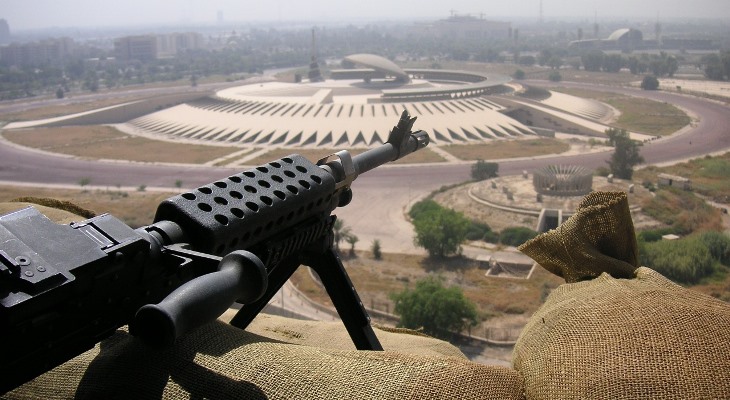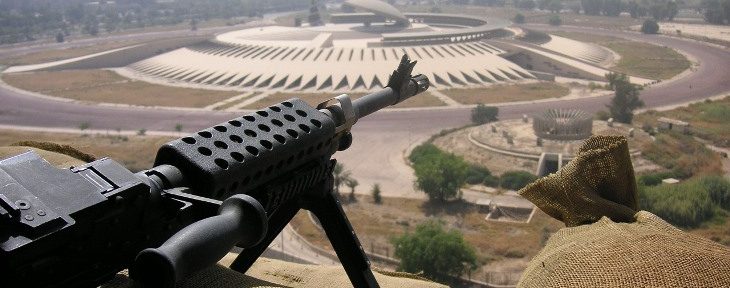This post was contributed by Dr Frederick Cowell, lecturer in Law at Birkbeck. Here, Dr Cowell, offers an initial analysis of the report of the Iraq Inquiry from the perspective of its consequences for international law. Published today, the report follows a seven-year investigation into Britain’s involvement in the Iraq War.

The Report of The Iraq Inquiry (known as the Chilcot report) was released today. Unlike its predecessors, the Hutton Inquiry and the Butler Report which examined individual elements of the build-up to the 2003 Iraq war; this had a much more wide ranging brief to examine all of the causes of the Iraq war. Its wide ranging focus meant that it took over seven years to complete but this is justified given the complex nature of the conflict and Chilcot is careful to put things into a historical context beginning with the UN response to the 1990 invasion of Kuwait by Iraq.
The report is fairly unequivocal in its criticism that the 2003 war was ill planned and had a highly problematic legal basis, with Sir John Chilcot saying in his press conference that “the circumstances under which the UK decided there was a legal basis for war were far from satisfactory”.
There are some serious questions to be asked about the nature of government and structures in the UK in particular the Joint Intelligence Committee (JIC) – the body in the Cabinet Office responsible for directing the national intelligence organisations and running intelligence in government. In the executive summary the report criticises the JIC for conveying “certainty” in their intelligence assessments “without acknowledging the limitations of the intelligence” at hand. There is also some strong criticism of Tony Bair not least his commitment to stand by the then President of The United States, George W. Bush in the invasion of Iraq.
This is a brief overview of the some of the key points of the report with respect to the consequences for international law.
- The Illegality of the War
It is important to note that the report is not the judgment of a court and therefore does not give any rulings about whether or not the actions of the UK government were definitively illegal. It is also not possible as things currently stand to prosecute Tony Blair at the International Criminal Court for ordering the invasion of Iraq (I explain why here). Nevertheless the report makes it clear that the decision to invade Iraq was of highly suspect legality. Under the UN Charter military action is permitted to enforce the decisions of the UN Security Council. But this has to be explicitly authorised by the UN.
The report notes on page 27 of Volume 1 that the assumption that there is a “residual right for individual Members to enforce Security Council decisions” cannot be considered correct. After the invasion of Kuwait in 1990 the UN Security Council had authorised UN military action to liberate Kuwait and then in response to the worsening humanitarian situation in Iraq authorised military action to protect civilians (in the form of No-Fly zones).
UN Security Council Resolution 1441 of November 2002 demanded that weapons inspectors be readmitted into Iraq to begin an extensive uninterrupted programme of weapons inspection and warned that unless Iraq cooperated “fully in the implementation of, this resolution” it would constitute “a further material breach of Iraq’s obligations”. In this context the advice given to by the Attorney General to the Prime Minister on the 11th of March 2003 made it clear that Resolution 1441 was “capable of reviving” the authorisation of Resolution 678 which authorised action against Iraq in 1991. This as several scholars have argued was a very thin basis for legality and the report is highly critical about the fact that the different views were not put to the Cabinet in making this decision, in particular the conclusion that a Security Council resolution explicitly authorising military action was necessary.
The upshot of the Chilcot report in this area is likely to be a strong restatement of the principle that any military action without explicit Security Council authorisation is illegal. In Libya in 2011 this was obtained but resolutions on Syria have not explicitly authorised the use of force in relation to the ongoing military action in Syria, although there may be an alternate legal basis for such action. The report also concludes that Britain was wrong to conclude that in 2003 Saddam posed a threat to the UK, justifying the use of force under the principles of self-defence in international law. However, on page 66 of volume 1 it notes that in the mid-1990s the sanctions regime was preventing Saddam Hussein developing missiles with the capacity to launch weaponised biological agents, indicating that the sanctions regime on the county was at least partially effective.
- Humanitarian Intervention
Since the mid-1990s in the aftermath of the Rwandan genocide international lawyers and policy makers have debated the creation of a doctrine of military intervention into a state where crimes against humanity and Genocide are occurring. In 1999 NATO forces attacked Serbia to prevent attacks on Kosovans and although this lacked specific authorisation by the Security Council an international commission later concluded that the invasion was “illegal but legitimate”.
Professor Bill Bowring has criticised this conclusion noting that it paved the way for the legal advice that the Iraq war was illegal. In 2004 and 2005 a UN Commission looked at the creation of a legal doctrine of the Responsibility to Protect, which by 2009 had emerged as a general set of principles rather than a definitive legal doctrine. The principle moral argument behind humanitarian intervention JL Holzgrefe argues is that it is act utilitarian – in that it justifies action on the basis of favourable outcomes – rather than rule utilitarian – which justifies acts on the basis of existing rules designed to aggregate general well-being. This was the point of Tony Blair’s 1999 Chicago speech which set out the basis of humanitarian intervention; war was dangerous but often less dangerous than letting a dictator commit human rights abuses.
The Chilcot report’s conclusions on the aftermath of the war and long term planning arguably undermine the claim that the Iraq war could be justified on humanitarian grounds. It notes in section 7 of the report that “the diplomatic options had not at that stage [when the war started] been exhausted” and criticises the way that the build up to the invasion was run to a strict military timetable rather than considering a political solution. Furthermore it details in some depth how the post-war planning did not include any real planning as to how the post-invasion situation in Iraq would be managed or what would be put in place to enable transition.
What is particularly damning in the light of subsequent developments in Iraq is the transcript of a JIC report in April 2003 which noted that “the local population had high hopes that the Coalition would rapidly improve their lives” but that resentment “could grow quickly if it is seen to be ineffective” (Vol 8 p. 474). The impact of this for the doctrine of humanitarian intervention is likely to be that much more attention is paid to the impact of military action in post-conflict societies in subsequent debates on the doctrine’s legality as that is the only way for the principle to be consistent with any form of legal or moral principle.
- The Authority of the Security Council
The Security Council under the UN Charter is the supreme decision making body on matters relating to the interpretation of the Charter and the use of force under Chapter VII of the UN Charter. As studies of international organisations have shown, the UN Security Council’s decisions and Resolutions have a reasonably high degree of compliance because the UN has a form of content independent legitimacy to it and it is believed as an institution. The Chilcot report is very critical of the British government for undermining the authority of the Security Council in the run up to the 2003 war. It notes that they were aware that if they tried to get a Resolution explicitly authorising the invasion of Iraq that it would be vetoed by other Security Council members.

Dr Frederick Cowell
It also notes that the diplomatic process was undermined to the extent that prior commitments to military action were “allowed to dictate the diplomatic timetable” (vol. 6 p.631). This undermined not only the authority of the UN but the weapons inspectors themselves who were not allowed to complete the function that had been entrusted to them. The UN Security Council is facing a series of unprecedented threats to its legitimacy due to ongoing issues in Syria and the Ukraine and the details of how the US and UK were able to subvert its by-pass its authority are likely to exacerbate this.
There is likely to be a lot more to be said about the Chilcot report, which is nearly 2 million words long, and this only a preliminary assessment of the consequences for international law.
Find out more



